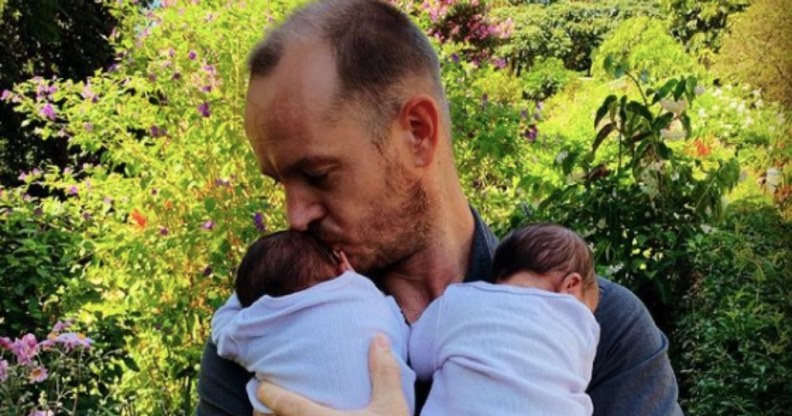Namibian court shoots down gay couple’s plea to finally bring their daughters home

Phillip Lühl and his twin daughters in South Africa. (Instagram/@phillipluehl)
A top Namibian court rejected Monday (19 April) a gay couple’s plea to return home with their twin daughters, born in South Africa through surrogacy.
In a case that threw the republic’s decades-old restrictions on LGBT+ people into question, Phillip Lühl and his husband Guillermo Delgado have fought the government to bring their children, Maya and Paula, to Windhoek.
Lühl is currently stuck in Johannesburg, South Africa, with the newborns. Delgado is in Windhoek with the couple’s two-year-old son – they are also fighting for citizenship for him, too – waiting for them to return.
But Namibian authorities have scuppered the couple’s attempt to acquire travel papers to reunite since the twins were born in March.
Officials claim neither infants are citizens, so would be required to take a paternity test to prove Lühl is their father – both Lühl and Delgado are listed on the newborn’s birth certificates.
View this post on Instagram
So Lühl, a 38-year-old Namibian citizen, filed an urgent application to the judge to strong-arm the home-affairs ministry to issue provisional travel documentation for the twins.
The university lecturer stressed that, if the children were born into a mixed-sex family, the authorities would not have refused entry for the family.
But in a devastating blow, the judge at the Windhoek High Court shrugged off Lühl’s request.
Handing down his ruling, judge Thomas Masuku said the order would be a “judicial overreach”, according to Reuters.
The ruling effectively severs the family and further compounds the sense of frustration they feel against Namibia’s government, one they see as “resistant” to LGBT+ rights.
The republic’s demand that they supply proof of a biological connection between the infants and the couple to secure the papers was akin to state-sanctioned discrimination, they said.
“[It’s an] unexpected judgment and, on a personal level, quite a big blow to us,” Lühl said.
“It comes as quite a shock,” he added to AFP, adding that the judgement “fits within this larger picture of very harsh resistance to make any progress in terms of equal rights for all”.
In Namibia, while what was once a culture of hostility has eased over the years, homosexuality between men is still illegal due to a Roman-Dutch common law still in the books.
The government has long batted away efforts to appeal the rarely-enforced sodomy law, including from the United Nations, alongside calls to recognise marriage equality.

